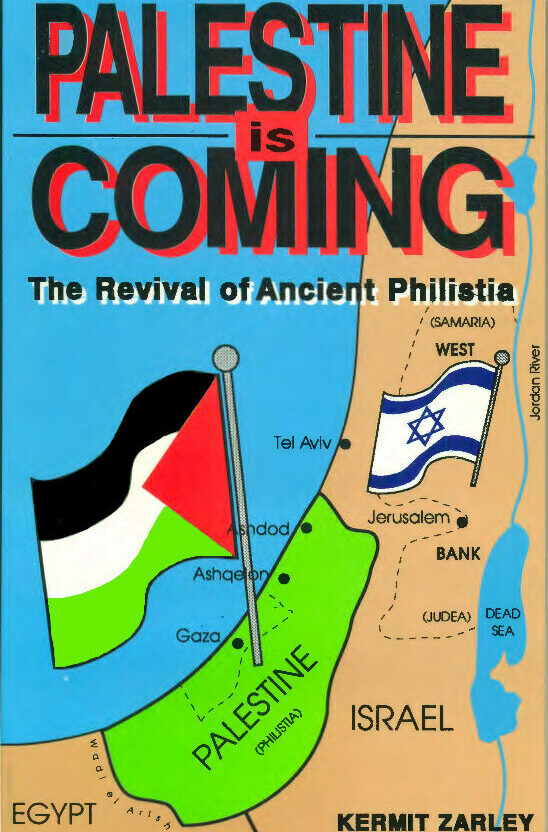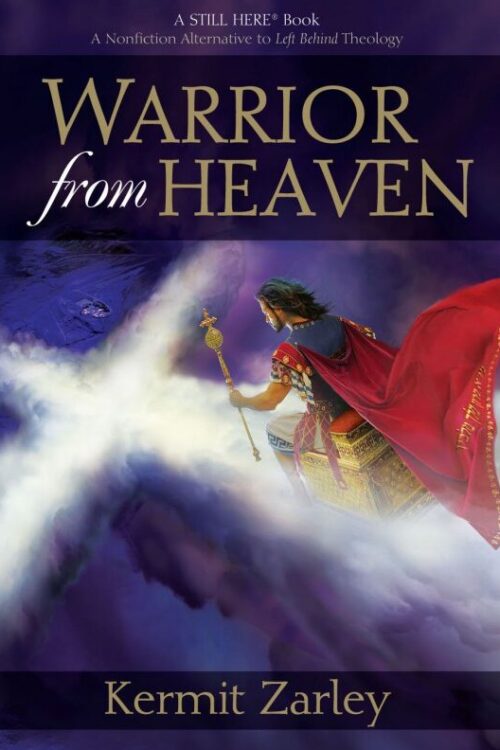Description
PRODUCT DETAILS
Title: Palestine Is Coming
Subtitle: The Revival of Ancient Philistia
Publisher: Hannibal Books
Date of Publication: 1990
Distributor: Wipf and Stock Publishers
Author: Kermit Zarley
Language: English
Format: Paperback
Page Count: 270
Weight: 11.2 ounces
Dimensions: 5.45 x 0.57 x 8.5
Category: 1. Palestine 2. Israeli-Palestinian conflict 3. Biblical eschatology
ISBN: 978-1-55635-181-5
DISCLAIMER
(I apologize to the Palestinian people for the incorrect placement of colors on the picture of the Palestinian flag on the front cover of the print version of this book. The green and black colors should have been reversed.)
REVIEWS
“Demonstrates much historical and biblical research, contains excellent notes and indices.”
~ Miami Herald newspaper
“The book is an important one. . . . A timely antidote to misguided ‘Christian Zionism’ . . . . faithful to the Scriptures, well presented, researched and referenced and deserves a wide circulation.”
~ Watching and Waiting magazine
“A fascinating book of history, eschatology and biblical studies. . . . worthy of serious contemplation. . . . makes several important contributions. . . . very accurate history of the conflict. . . . Zarley’s proposal for a Palestinian state is, in fact, just about the only workable solution imaginable.”
~ Criswell Theological Reviews’ Paige Patterson, President of Criswell College
“The idea has merit, and this book may contribute to the peace process.”
~ The Bloomsbury Review
“Mr. Zarley finds the answer to Zionist-Palestinian tensions in reverting to the Biblical geography of three thousand years ago, where the Philistines, perennial foes of Israel, never relinquished the coastal lands south of Tel Aviv and extending into Egypt. The author knows his Old Testament geography well, but it does not work as a yardstick for religious homesteading today. When two manifest destinies collide, solutions must not be expected to be so simple. First of all, to name Palestinians as recognizable descendants of the Philistines, as Mr. Zarley does, is debatable. More important, however, is the question of ancient precedence determining contemporary land claims. As history breathes, moves on, takes new shape, efforts to turn back the clock become increasingly difficult, and finally irrelevant. Nightmares of social dislocation would result if this thesis were made universal. Mr. Zarley has shown again, however, that the world is a balloon, where pushing it in one place produces a bulge in another. When the political entity, Israel, went in search of a locality in 1948, it proved the point, and now, he reminds us, only compromise will resolve the protrusion. If his specific proposals seem of mixed merit, who knows what spin-off concepts might provide the needed accommodations? The author is a peacemaker and his work is a probing for peace.”
~ Independent publisher
Kermit’s response:
“it does not work as a yardstick” for “ancient precedence determining contemporary land claims.” In his book, Zarley quotes the entirety of Israel’s 1948 Proclamation of Independence which does that very thing repeatedly. It says, “The Land of Israel was the birthplace of the Jewish people… Impelled by this historic association, Jews strove throughout the centuries to go back to the land of their fathers and regain their statehood… This right was acknowledged by the Balfour Declaration of November 2, 1917, and re-affirmed by the Mandate of the League of Nations, which gave explicit recognition to the historic connection of the Jewish people with Palestine and their right to reconstitute their National Home… This recognition by the United Nations of the right of the Jewish people to establish their independent State in Palestine is unassailable.”
~ Kermit Zarley







Amazon Review –
Full disclosure; Kermit is a friend and fellow student of the Hebrew language. I enjoyed reading this book and learned alot. Its divided into 3 sections: The Ancient Past, The Modern Present and The Coming Future. The first 2 sections provide an excellent review of historical events related to the state of Israel, while the 3rd section discusses the future of the region in the light of Bible prophecy. Two key aspects of Kermit’s case are that 1) God gave land to each nation, including Philistia, and 2) Israel NEVER ruled Philistia completely (i.e. never fully obeyed God’s directive). Its greatest extent of control over Philistine territory came during the 20-year period of 96-76 BC during the rule of Hasmonean leader Alexander Jannaeus. From this, Kermit argues that modern Israel’s occupation of the Plain of Philistia is contrary both to historical precedent and also to the express will of God (44, i.e. He’d given the land to the Philistines, later challenging the Israelites to take it [by trusting Him to give them victory in battle], but they failed to do so [i.e. their fear of the Philistines overcame their faith in God to deliver victory]).
His proposal involves carving out historic Philistia for a Palestinian state, from the usually dry stream “Wadi el Arish” in NE Egypt as its SW border to the seasonal stream “Nahal Sorek” in the NE (between Ashdod and Joppa/Tel Aviv), extending roughly 15 miles inland across what the Bible calls the “Philistine Plain” to the Shephelah (i.e. “lowlands”), to include all 5 historic Philistine cities of Gaza, Ashkelon, Ashdod, Ekron and Gath. Most of the land would come from Israel, with a small section in the SW coming from Egypt. While this is a very interesting idea, it seems unlikely to me that the Palestinians would agree to it, nor would Egypt likely be willing to part with any land in her NE region, as required by this plan. Though if all parties truly want peace, I agree with Kermit that this is a promising blueprint for that goal. Practically speaking, I would think giving the Philistine Plain to the Palestinians would be much less painful to Israel than parting with the biblically and historically (for them) much more meaningful West Bank.
I couldn’t help but chuckle when I got to the one little “catch” for the Palestinians in being given the Philistine Plain; that while Isaiah 11 fortells that “a people whom the prophet called the Philistines (Palestinians?) might yet be reestablished in ‘the land of the Philistines’ … the context of Isaiah 11:14 concerns the yet future Messianic DESTRUCTION of Israel’s neighbors, the Philistines and the Jordanians” (191). So here’s the offer: “Sure, you can have the land, but there’s just one tiny little catch!” 🙂
I have several concerns about Kermit’s case, including his citation of McGovern (104) and Carter (107) statements in support of the idea that under international law the Palestinians are just as entitled to self-determination in Palestine as the Jews. As a conservative, I don’t view the opinions of these 2 leftist politicians as authoritative. And remember the whole point of reestablishing Israel has been to provide a safe homeland for the Jewish people. Further, WWI/II demonstrated that the idea of “self determination” is not workable for every people group. Even Wilson’s own Sec’y of State Robert Lansing groaned that it was based on fantasy and would lead to impossible expectations and untold suffering and death (which it did). Walter Lippman later agreed, noting that it encourages intransigence, discourages cooperation. On the other hand, if the Palestinians were to agree to renounce terror, recognize Israel, and reclaim the [God-authorized] Philistine land, then I’d have to go along with Kermit on this.
Kermit notes interestingly that the Palestinians are widely seen as the most educated, sophisticated Arabs. He discusses the controversy over Palestinian “identity” i.e. whether it has always existed or was “developed” only after 1964 by the PLO and others as a PR tool. I’d add that the Palestinian cause was greatly harmed when the Grand Mufti of Jerusalem allied it with Hitler during WWII. Finally, any revived Palestinian state without renunciation of terror and recognition of Israel would have the horrible effect of rewarding terror and anti-Semitism!
Kermit notes that when the UN recognized the PLO in Resolution 3236 shortly after Arafat’s October 1974 speech, it was “the first and only time the UN [had] granted such status to a revolutionary [i.e. violent, terrorist] organization” (122). It seems to me that the UN was wrong then and Reagan was right in 1987 to refuse to recognize it (122, Kermit disagrees). Kermit thinks America should be more even-handed between Israel and Palestinians. He lists 5 factors that prevent this, especially the “Religious Right” (140ff). He advises us evangelicals to reconsider uncritical support of Israel. Hmmm, related to this, I find it curious that Palestinians are generally supported by the Left, Israel by the Right (i.e. apparently part of the “culture wars”). Kermit notes the paradox (149) of the American evangelical Right strongly supporting the mostly secular, left-leaning Israeli Jews. Hmmm, while the original Zionist settlers were mostly secular leftists mainly supported by European leftists, this changed after the 1967 war, when Palestinians replaced Israel as ‘underdog’ and Israel began to be viewed as a neo-colonial aggressor. Losing European support, Israel moved closer to the US as the Israeli Labor party lost ground to Likud.
Despite these reservations, I recommend this book. If all sides truly want peace, this plan could actually work!